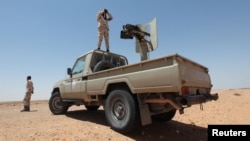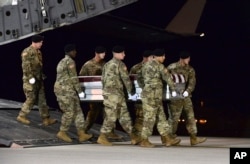The chair of the House Homeland Security Committee says Africa will be the next "hot spot" for Islamic extremism, amid growing concern about Islamic State migration and recruitment after U.S.-led forces in Iraq and Syria reclaimed the group's so-called caliphate in the Middle East.
"They seek ungoverned territories and safe havens," Republican Congressman Michael Thomas McCaul Sr. of Texas said Wednesday. "Africa is going to be the spot, it's going to be the hot spot."
Speaking at a House Foreign Affairs Committee hearing, Deputy Secretary of State John Sullivan said keeping track of where Islamic State fighters are fleeing is a priority for his department.
"We are very focused on where those terrorist fighters that are leaving the caliphate, what's left of it and there isn't much in Syria and Iraq, where they're going," he said.
He added that part of the African continent, especially northeastern Nigeria and Libya, have appeared to be a landing place for IS militants. He stressed, however, that Africa's extremism problem cannot be solved by military action alone, emphasizing that good governance is important to help fulfill the needs of people across the continent.
Congressman Adam Kinzinger, R-Ill., said Wednesday that African nations, with young populations and high unemployment, have become the "prime recruiting pool for terrorist groups."
Niger
The U.S. focus on extremism in Africa continues to grow since four American soldiers, four Nigerien soldiers and a Nigerien interpreter were killed in an October attack by Islamic State militants in Niger.
For the first time, a Pentagon official Wednesday publicly identified the two American soldiers wounded in Niger during a deadly ambush earlier this year.
Captain Michael Perozeni and Sgt. First Class Brent Bartels were wounded near the village of Tongo Tongo on Oct. 4, according to Acting Defense Undersecretary for Policy David Trachtenberg, who wished the two a speedy recovery during his testimony in front of the House Foreign Affairs Committee.
A formal investigation into the deadly ambush in Niger is not expected to be completed until January, according to the U.S. military.
Libya
Pockets of Islamic State fighters have also launched attacks in Somalia and Libya, a country Sullivan said was perhaps the "greatest counterterrorism challenge in Africa." In the past couple of years, Libya's ungoverned areas have produced droves of local extremists and foreign fighters.
Sullivan said the United States has focused on land-and-sea border security for Tunisia, Libya's neighbor, while working alongside the Libyan Government of National Accord (GNA) to help rid the country of terrorists.
"What we don't want is a place where, as there was in Sudan in the 1990s or Afghanistan in the late '90s early 2000s, places where terrorist organizations can plant root, flourish, plan attacks against the United States," Sullivan said.





